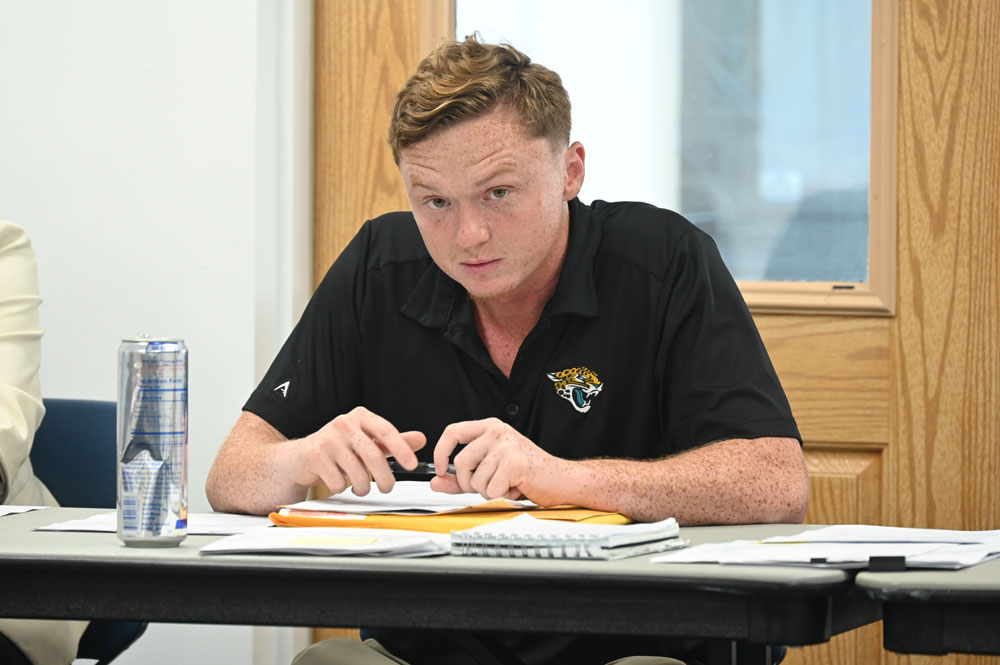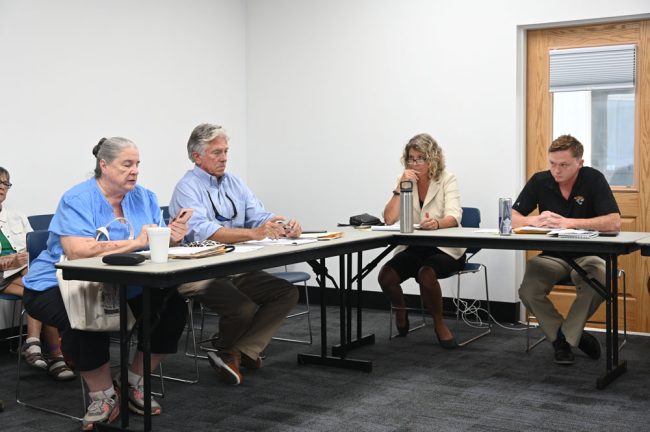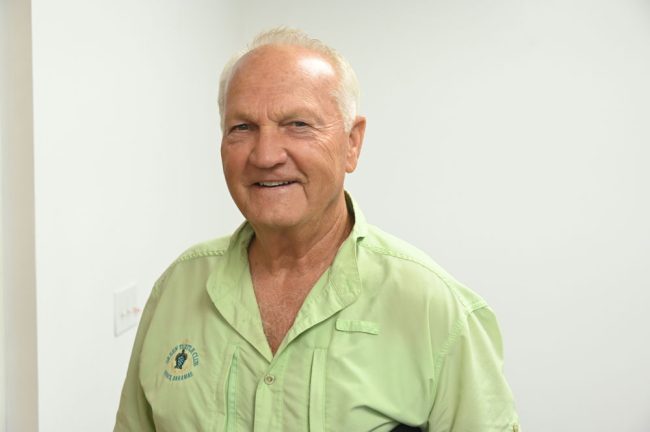
In another gust of dysfunction underscoring Marineland’s increasingly nonsensical status as a town, rookie Mayor Douglas “Dewey” Dew on Wednesday and Thursday attempted but failed to fire Town Manager Suzanne Dixon and Town Attorney Dennis Bayer, starting with an Aug. 20 email “request” that they resign immediately. He sent the email unilaterally, without the authority of the commission and outside of a public meeting.
Moments before Thursday’s Town Commission meeting, he followed up with emails to Dixon and Bayer ostensibly outlining vague, subjective causes justifying the firing, which he confused with a “suspension.”
Bayer and Dixon have been with the town since Dew was in diapers: Dixon started in April 1996, Bayer started shortly after. Dew was born in 1994. In the past few months, the town lost its mayor and is now on its third town clerk of the year. Without Bayer and Dixon, the town would lose the near-totality of its institutional memory, its administrative experience, and its procedural ethics at a time when it is floundering to be a town, and when its rickety, privately run sewer plant is preventing new economic activity. “There’s so many things right now hanging over the whole town,” Jessica Finch, its only other commissioner, said.
Dew won office in a controversial election less than a year ago. Dew became mayor in May following the death of Gary Inks. Dew unilaterally appointed Finch in a legally dubious move, against Bayer’s advice, relying instead on the advice of his personal attorney, Rick Rumrell, whom he’d brought into the meeting.
Bayer, after consulting with numerous municipal and county attorneys, had suggested that the town seek an attorney general’s opinion on how the town might proceed with an appointment to the commission when it lacks a majority to make such an appointment. Dew refused, and called Bayer’s advice “dereliction” and not “in the best interest of the town.” It was unclear at the time what Dew meant by “town,” a noun that in that context seemed more synonymous with Dew.
Finch in May told a somewhat hostile audience that she had “just jumped out of a frying pan into a fire, and I can tell you, it’s a fire.” She was not exaggerating. She insisted she was taking the job only to help the town. She lived up to her pledge Thursday when she refused to go along with Dew’s power play. She’d been “stunned” to get a copy of his emails to the two town officers and felt hurt on behalf of Dixon, who’s paid a mere $250 a month for work that typically far exceeds the pay.
“I don’t think that anything has been laid out against these two people that is enough for dereliction of duty or neglect,” Finch said, refusing to lend her vote to dismiss either. She appeared taken aback by Dew’s arbitrariness and haphazardness (not just on that issue Thursday evening). The third commission seat being vacant, a tie vote meant Dew’s move would fail. He didn’t push for a vote, knowing his gambit lost.
According to the town charter, the mayor has the authority to “suspend any officer or employee,” and only for “gross neglect or dereliction of duty.” The person suspended must be invited to the next scheduled commission meeting, where the mayor must justify the decision, giving the commission the opportunity to ratify or reject the suspension.

Inexplicably, Dew repeatedly insisted at Thursday’s commission meeting that he had not suspended Dixon or Bayer, even though he had that authority. He said he had only asked them to resign–which the charter does not give him the authority to do.
Dew accused Bayer of putting “falsehood” in a memo about the appointment, and went on the claim, without evidence, that it was “it was ill-advised and unnecessary and unwarranted, with ill intentions to create unnecessary drama and misinformation throughout the community of Northeast Florida.”
In fact, Bayer had consulted with Drew Smith, the respected city attorney in Flagler Beach, “who ran the whole scenario by his partners’ law firm of Shepard Smith and Hand, one of the biggest local government law firms Central Florida,” Bayer said. “They agreed with my position and came up with a suggested solution, which you didn’t want to hear.” Bayer also consulted with then-County Attorney Al Hadeed. “He said he had some concerns about it as well,” Bayer told Dew. And of course also relied on his long experience. Dew is not an attorney. He works in a healthcare-related IT firm. One of the emails he sent Dixon, however, from which she read at the meeting, appeared to have been lawyered.
In the separate, initial email to her, Dew lavished accolades on Dixon even as he requested her resignation. She replied: “I was appointed town manager by the Marineland town commission on April 1, 1996. Since then, I have faithfully served five mayors and numerous commissioners. Imagine my utter shock when I received an email from the sixth mayor, Dewey Dew, requesting my resignation immediately. I choose not to resign. If I am to be dismissed, you must do it face-to-face in a public meeting.”
Dew defended himself, after falsely accusing Dixon of opening ballots in secret last year. “The town manager took ballots home and opened them without witness or proper oversight, violating election laws,” Dew wrote.
“I’m coming from a good place here, okay, I’m trying to come in here and understand how this operates,” he said. (Dixon and Bayer said their emails to him on town matters have gone unanswered since July.) He continued: “I have good intentions. My heart’s in the right place in doing this. I want to see this place succeed. Okay? And everyone’s been trying to trip me up every step of the way, and we are just being honest on how we’re following the rules. So that’s what I was doing with all this.”
Dixon wasn’t satisfied. “You’re questioning my integrity on the election and the procedures,” she said. “I did not tamper with the ballots, and please don’t ever accuse me of that. I am honest, I am ethical to a fault, and I have done my best in the last year to support you in every way. I have no grievance against you.” Dew also accused her of disqualifying another candidate last year. The candidate, a write-in, was not seated.
“This is absolutely ridiculous,” Catherine Eastman, the program manager at the Sea Turtle Hospital at Whitney Laboratory in Marineland, told the mayor during a public comment segment when the firing was still on the table. “I don’t know what kind of town you think you’re going to be able to run without this historical information, but it’s not going to be a town. You’re lucky to have either of them. And now Ms. Finch on this commission. Because without them, you’re running it right to the ground. You don’t get government.”
Others who spoke were no less bluntly critical. “It makes people wonder, what’s the motivation behind this?” Barbara-Anne Battelle, who for 30 years ran the University of Florida’s Whitney Laboratory in Marineland, told Dew. “People that have done their jobs and that the community obviously supports, like, what’s the agenda? What’s behind this?”
Dew had near the beginning of the meeting delivered an oddly sycophantic tribute to Jim Jacoby, the developer and principal landowner in town, attributing Marineland’s legacy “in large part to the visionary leadership of Jim Jacoby as a key figure in Marineland’s revitalization” and “restoring the historic oceanarium” while “breathing new life” into the town. It isn’t clear what town Dew was referring to: the town is down to three residents, the oceanarium is in bankruptcy, Jacoby is looking to divest, and the town commission itself is in upheaval.
Finch, referring to recent controversies, said the town commission needed to revamp its procedures wholesale and get away from what Dixon said was a “hand-me-down” culture of administrative operations. Bayer proposed a future workshop on the subject. The charter has never been revised or amended since its adoption in 1969, when the town was so different that it was to have a town judge, a chief of police and a fire chief. It has none of those.
Marineland was known for pioneering surreal underwater filming. The filming is long gone. The surrealism is not.
It has three registered, eligible voters: Dew, Finch and Joseph Pinder. Three additional people are registered in town but no longer live there, so are not eligible to vote, according to the town manager: Kelly Fischbach, Brandon Powell, and Barrett Wilson.

The town is holding an election to fill the commission’s third seat on September 2. The voters are Dew, Finch and Pinder. It’s not clear why there is an election since Pinder would be uncontested as the only eligible candidate. Pinder is almost certain to be “elected.” So the only three residents of the town will be its three commissioners.
They may choose a new mayor next month. Given Dew’s gift for stumbles and overreaches, they may opt for either Finch or Pinder, who are close, and who each were elected officials in other towns, Finch in Welaka, a town of 700 people south of Palatka, Pinder in Islamorada in the Keys.
Pinder is related to Jim Jacoby, the Atlanta-based developer and owner of most of the only privately held properties in town, whose tax revenue essentially underwrites a majority of the town budget. Dew is also a Jacoby advocate, and Jacoby’s shadow looms larger in town than its now-bankrupt Dolphin Adventure, which is $91,000 in arrears in taxes owed the town.
Meanwhile Flagler County and three state agencies are in talks with Jacoby, through the North Florida Land Trust, to acquire 35 acres of JDI Marineland, the Jacoby-owned concern. Those parcels together generated about $150,000 in property tax revenue for Marineland, which JDI pays promptly. Marineland’s entire budget is $257,000.
So JDI accounts for 58 percent of that (the proportion is significantly higher when a non-recurring federal grant is excluded from the accounts). If the land trust deal is successful, the land will immediately be off the property tax rolls, since it will be government land, and Marineland will lose that revenue. It’ll be left with $22,000 in Florida Power and Light franchise fee revenue, a little rental income, and other minor revenue sources. It will not have the means to function even as a dysfunctional town.
Bayer brought up the land trust deal Thursday during the separate, earlier meeting of the town’s Community Redevelopment Agency, with County Commissioner Greg Hansen as one of the CRA board members, along with Finch and Dew. “I don’t know if we’ll be successful or not,” Hansen said of the potential land deal. You know, working with Jacoby, I don’t know,” Hansen said, his laugh hinting at the unpredictable nature of those negotiations.
“He’s a good man,” Dewey said of Jacoby. He was not interested in discussing the matter further.






























All Business says
Ha! Young new blood coming in and firing all the Boomers? Hilarious! We wouldn’t be so lucky that the new 26 y/o HR Director at the county could fire the administration?!?
Tt says
This must be a republican gerrymander or something, Marineland population 9. That is not a town or city maybe a village or something. The mayor of 9 people. A basketball team has more people.
FlaglerLive says
Marineland’s population is 3, not 9.
Larry says
Looks like the Mayor of Marineland is attempting to copy the behavior of Mayor Mike Norris of Palm Coast.
Palm Coast Citizen says
So the whole population is in the government? They’re just squabbling? Three people?
Pogo says
@Choose
https://www.bing.com/search?q=ridiculous+vs+absurd
Atwp says
The 10th and 13th paragraphs sound like Trump. I go through Marineland twice a week because of my job, I thought the town had more than less than 10 residents. I guess I’m seeing tourists. The town should be very rich.
Jack says
The unseen hand here appears to be Jim Jacoby. He is the Grand Puppeteer of Marineland. And he lives 350 miles away in Atlanta.
Dillan says
Wow more people in my house than the “town” of marineland. Should I declare to be my own town and get those government dollars! Don’t want to be part of a fascist nation though… I could be the mayor of my house ! Definitely seems like a republican gerrymander and fraud to me!
FedUpWithFlaglerCounty says
Dew would fit right in and be a great candidate for any position in the Cesspool of Palm Coast.